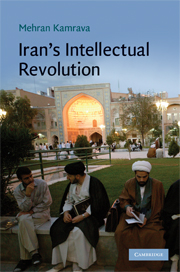Book contents
- Frontmatter
- Contents
- List of tables
- Acknowledgments
- 1 Introduction
- 2 Emerging Iranian discourses
- 3 Theorizing about the world
- 4 The conservative religious discourse
- 5 The reformist religious discourse
- 6 The secular-modernist discourse
- 7 Iran's silent revolution
- Bibliography
- Index
- Cambridge Middle East Studies 29
7 - Iran's silent revolution
Published online by Cambridge University Press: 06 July 2010
- Frontmatter
- Contents
- List of tables
- Acknowledgments
- 1 Introduction
- 2 Emerging Iranian discourses
- 3 Theorizing about the world
- 4 The conservative religious discourse
- 5 The reformist religious discourse
- 6 The secular-modernist discourse
- 7 Iran's silent revolution
- Bibliography
- Index
- Cambridge Middle East Studies 29
Summary
The 1978–79 revolution ushered in a new era of thought and intellectual endeavor shaped by the realities of post-revolutionary zeal, war and international tensions, the institutionalization of supreme religious authority, and the reconstruction of the institutions of the state that the revolution had dismantled. After about a decade of revolutionary fervor and unprecedented levels of political repression, the end of the war with Iraq in 1988 and the death of Ayatollah Khomeini the following year resulted in a gradual opening of political space. Slowly but steadily, this allowed for the measured articulation of alternative, non-state sanctioned worldviews about idealized visions of the polity and the self. Before long, three different discourses were vying for greater acceptance and popularity by the urban middle classes. These are a discourse of religious conservatism, which largely underwrites the theoretical assumptions and institutional arrangements of the Islamic Republican state; a discourse of religious reformism, which seeks to fundamentally alter the interpretations on which most Islamic doctrines and notions are based; and a discourse of secular-modernism, which assumes that the acquisition of modernity and its many offerings will only be made possible through pushing religion out of the public arena. Previous chapters examined the emergence of each discourse and the main premises on which it is based. Here, by way of conclusion, I assess the relative strengths and weaknesses of each discourse and point to some of the factors likely for their success or failure in the coming years.
- Type
- Chapter
- Information
- Iran's Intellectual Revolution , pp. 214 - 226Publisher: Cambridge University PressPrint publication year: 2008



